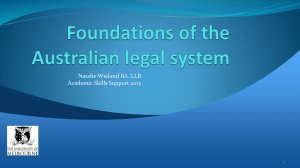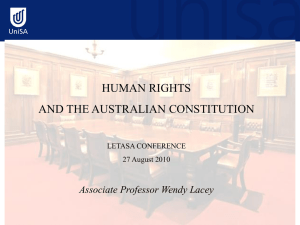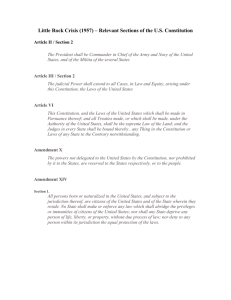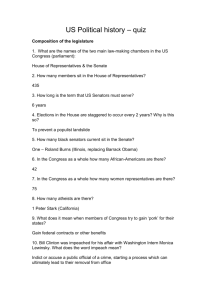CLRG Law – Natural Justice in Australia
advertisement
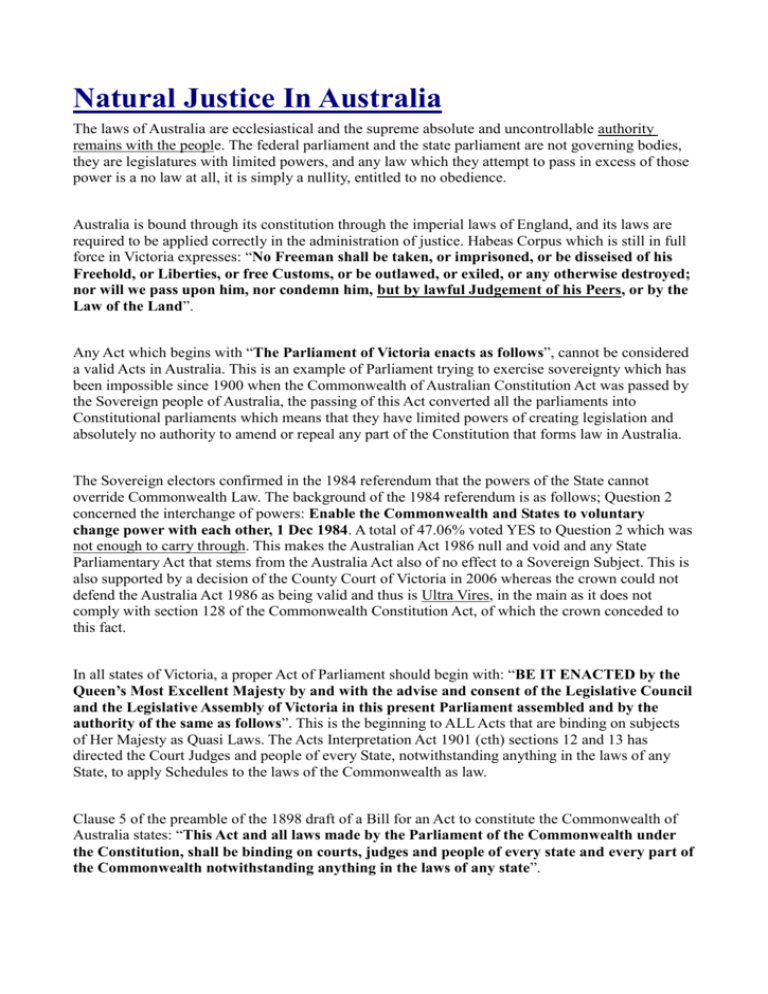
Natural Justice In Australia The laws of Australia are ecclesiastical and the supreme absolute and uncontrollable authority remains with the people. The federal parliament and the state parliament are not governing bodies, they are legislatures with limited powers, and any law which they attempt to pass in excess of those power is a no law at all, it is simply a nullity, entitled to no obedience. Australia is bound through its constitution through the imperial laws of England, and its laws are required to be applied correctly in the administration of justice. Habeas Corpus which is still in full force in Victoria expresses: “No Freeman shall be taken, or imprisoned, or be disseised of his Freehold, or Liberties, or free Customs, or be outlawed, or exiled, or any otherwise destroyed; nor will we pass upon him, nor condemn him, but by lawful Judgement of his Peers, or by the Law of the Land”. Any Act which begins with “The Parliament of Victoria enacts as follows”, cannot be considered a valid Acts in Australia. This is an example of Parliament trying to exercise sovereignty which has been impossible since 1900 when the Commonwealth of Australian Constitution Act was passed by the Sovereign people of Australia, the passing of this Act converted all the parliaments into Constitutional parliaments which means that they have limited powers of creating legislation and absolutely no authority to amend or repeal any part of the Constitution that forms law in Australia. The Sovereign electors confirmed in the 1984 referendum that the powers of the State cannot override Commonwealth Law. The background of the 1984 referendum is as follows; Question 2 concerned the interchange of powers: Enable the Commonwealth and States to voluntary change power with each other, 1 Dec 1984. A total of 47.06% voted YES to Question 2 which was not enough to carry through. This makes the Australian Act 1986 null and void and any State Parliamentary Act that stems from the Australia Act also of no effect to a Sovereign Subject. This is also supported by a decision of the County Court of Victoria in 2006 whereas the crown could not defend the Australia Act 1986 as being valid and thus is Ultra Vires, in the main as it does not comply with section 128 of the Commonwealth Constitution Act, of which the crown conceded to this fact. In all states of Victoria, a proper Act of Parliament should begin with: “BE IT ENACTED by the Queen’s Most Excellent Majesty by and with the advise and consent of the Legislative Council and the Legislative Assembly of Victoria in this present Parliament assembled and by the authority of the same as follows”. This is the beginning to ALL Acts that are binding on subjects of Her Majesty as Quasi Laws. The Acts Interpretation Act 1901 (cth) sections 12 and 13 has directed the Court Judges and people of every State, notwithstanding anything in the laws of any State, to apply Schedules to the laws of the Commonwealth as law. Clause 5 of the preamble of the 1898 draft of a Bill for an Act to constitute the Commonwealth of Australia states: “This Act and all laws made by the Parliament of the Commonwealth under the Constitution, shall be binding on courts, judges and people of every state and every part of the Commonwealth notwithstanding anything in the laws of any state”. CONSTITUTION ACT 1975 (VIC) Section 3. Laws of England to be applied in the administration of justice (1) Subject to the Imperial Acts Application Act 19222 all laws and statutes in force within the realm of England on the 25th day of July, 1828 (not being inconsistent with any law now in force) shall be applied in the administration of justice in the courts of Victoria, so far as they can be applied within Victoria. (2) If any doubt arises as to the application of any such laws or statutes in Victoria, it shall be lawful for the Parliament by Act to declare whether such laws or statutes shall be deemed to extend to Victoria, and to be in force within Victoria, or to make and establish such limitations and modifications of such laws and statutes within Victoria as may be deemed expedient in that behalf. ACTS INTERPRETATION ACT 1901 - SECT 15A Construction of Acts to be subject to Constitution Every Act shall be read and construed subject to the Constitution, and so as not to exceed the legislative power of the Commonwealth, to the intent that where any enactment thereof would, but for this section, have been construed as being in excess of that power, it shall nevertheless be a valid enactment to the extent to which it is not in excess of that power. ACTS INTERPRETATION ACT 1901 - SECT 25D Content of statements of reasons for decisions Where an Act requires a tribunal, body or person making a decision to give written reasons for the decision, whether the expression "reasons", "grounds" or any other expression is used, the instrument giving the reasons shall also set out the findings on material questions of fact and refer to the evidence or other material on which those findings were based. Crimes Act 1958 Version No. 206 No. 6231 of 1958 Version incorporating amendments as at 11 February 2009 391 Plea of "Not Guilty" puts the accused on trial by jury; procedure where no evidence led If any person arraigned on any indictment or presentment pleads thereto "Not Guilty," he shall without further form be deemed to have put himself upon the country for trial; and subject to section 391A the jury for his trial shall in the usual manner be impanelled accordingly. MAGISTRATES' COURT GENERAL REGULATIONS 2000 SCHEDULE 2 Sch. 2 OATHS OF OFFICE Regulation 201(1) PART 1 OATH OF OFFICE OF MAGISTRATE OR BAIL JUSTICE I, [full name], swear by Almighty God that as a *magistrate for Victoria/*bail justice I shall at all times and in all things do equal justice to all persons and discharge the duties of my office according to law and to the best of my knowledge and ability without fear favour or affection. MAGISTRATES' COURT ACT 1989 PART 5—CIVIL PROCEEDINGS Division 1—Jurisdiction s. 100 100 Extent of jurisdiction (1) The Court has jurisdiction, subject to subsection (2)— (a) to hear and determine any cause of action for damages or a debt or a liquidated demand if the amount claimed is within the jurisdictional limit; and (b) to hear and determine any claim for equitable relief if the value of the relief sought is within the jurisdictional limit; and (c) to hear and determine, with the consent in writing of the parties— (i) any cause of action for damages or a debt or a liquidated demand, irrespective of the amount claimed; and (ii) any claim for equitable relief, irrespective of the value of the relief sought; and (d) to hear and determine any other cause of action if the Court is given jurisdiction to do so by or under any Act other than this Act. (2) The Court does not have jurisdiction in any cause of action— (a) in which the effect of, or the validity or invalidity of, any act, matter or thing done or omitted to be done by any person or body whatsoever in the exercise or purported exercise of any power or duty conferred or imposed on that person or body or purportedly conferred or imposed on that person or body by or under— (i) any royal prerogative; or (ii) any statute— POLICE REGULATION ACT 1958 OATH FOR MEMBERS OF THE POLICE FORCE OF VICTORIA I [full name] swear by Almighty God that I will well and truly serve our Sovereign Lady the Queen as a member of the Police Force of Victoria in such capacity as I may be hereafter appointed, promoted, or reduced to without favour or affection malice or ill-will for the period of from this date, and until I am legally discharged; that I will see and cause Her Majesty's peace to be kept and preserved; and that I will prevent to the best of my power all offences against the same, and that while I shall continue to be a member of the Police Force of Victoria I will to the best of my skill and knowledge discharge all the duties legally imposed upon me faithfully and according to law. Section 100. Entry, search and seizure (1) A member of the force may enter any place (including any vehicle on or in that place) or a particular vehicle located in a public place, and may search for and seize anything that the member believes on reasonable grounds may be evidence of the commission of a relevant offence that is found at that place or on or in that vehicle if the entry, search and seizure are made(a) with the consent of the occupier of the place; or (b) in accordance with a warrant issued under section 100A; or (c) as provided by section 100D. (2) The power conferred by this section to seize a thing includes the power(a) to remove the thing from the place or vehicle where it was found; and (b) to guard the thing at that place or that vehicle; and (c) to make copies of the whole or any part of the thing. (3) A member of the force must not enter and search any place with the consent of the occupier unless, before the occupier consents to that entry, the member has informed the occupier(a) of the purpose of the search; and (b) that the occupier may refuse to give consent to the entry and search or to the seizure of anything found during the search; and (c) that the occupier may refuse to consent to the making of copies of the whole or any part of anything found during the search; and (d) that anything seized during the search may be used in evidence in proceedings. AUSTRALIA ACT 1986 SECT 1 Termination of power of Parliament of United Kingdom to legislate for Australia No Act of the Parliament of the United Kingdom passed after the commencement of this Act shall extend, or be deemed to extend, to the Commonwealth, to a State or to a Territory as part of the law of the Commonwealth, of the State or of the Territory. SECT 2 Legislative powers of Parliaments of States (1) It is hereby declared and enacted that the legislative powers of the Parliament of each State include full power to make laws for the peace, order and good government of that State that have extra-territorial operation. (2) It is hereby further declared and enacted that the legislative powers of the Parliament of each State include all legislative powers that the Parliament of the United Kingdom might have exercised before the commencement of this Act for the peace, order and good government of that State but nothing in this subsection confers on a State any capacity that the State did not have immediately before the commencement of this Act to engage in relations with countries outside Australia. SECT 3 Termination of restrictions on legislative powers of Parliaments of States (1) The Act of the Parliament of the United Kingdom known as the Colonial Laws Validity Act 1865 shall not apply to any law made after the commencement of this Act by the Parliament of a State. (2) No law and no provision of any law made after the commencement of this Act by the Parliament of a State shall be void or inoperative on the ground that it is repugnant to the law of England, or to the provisions of any existing or future Act of the Parliament of the United Kingdom, or to any order, rule or regulation made under any such Act, and the powers of the Parliament of a State shall include the power to repeal or amend any such Act, order, rule or regulation in so far as it is part of the law of the State. SECT 5 Commonwealth Constitution, Constitution Act and Statute of Westminster not affected Sections 2 and 3(2) above: (a) are subject to the Commonwealth of Australia Constitution Act and to the Constitution of the Commonwealth (b) do not operate so as to give any force or effect to a provision of an Act of the Parliament of a State that would repeal, amend or be repugnant to this Act, the Commonwealth of Australia Constitution Act, the Constitution of the Commonwealth or the Statute of Westminster 1931 as amended and in force from time to time. SECT 8 State laws not subject to disallowance or suspension of operation An Act of the Parliament of a State that has been assented to by the Governor of the State shall not, after the commencement of this Act, be subject to disallowance by Her Majesty, nor shall its operation be suspended pending the signification of Her Majesty's pleasure thereon. Road Safety Act 1986 - SECT 4 Act to bind Crown 4. Act to bind Crown This Act binds the Crown in right of Victoria and also, so far as the legislative power of Parliament permits, the Crown in all its other capacities. Local Government Act 1989 SCHEDULE 8 Section 2. A local law must not(a) exceed the powers conferred by the Act under which the local law purports to be made; (b) without clear and express authority in the enabling Act(i) have any retrospective effect; (ii) impose any tax or fee, or any fine, imprisonment or other penalty; (iii) purport to shift the onus of proof to a person accused of an offence; (iv) provide for any further delegation of powers delegated by the Act; (c) be inconsistent with the principles, objectives or intent of the enabling Act; (d) make unusual or unexpected use of the powers conferred by the Act under which the local law is made having regard to the general objectives, intention or principles of that Act; (e) embody principles of major substance or controversy or contain any matter which principles or matter should properly be dealt with by an Act and not by subordinate legislation; (f) unduly trespass on rights and liberties of the person previously established by law; (g) unduly make rights and liberties of the person dependent upon administrative and not upon judicial decisions; (h) be inconsistent with principles of justice and fairness; (i) duplicate, overlap or conflict with other statutory rules or legislation; (j) restrict competition unless it can be demonstrated that(i) the benefits of the restriction to the community as a whole outweigh the costs; and (ii) the objectives of the local law can only be achieved by restricting competition. PART 5 LOCAL LAWS Power to make local laws 111. Power to make local laws (1) A Council may make local laws for or with respect to any act, matter or thing in respect of which the Council has a function or power under this or any other Act. (2) A local law must not be inconsistent with any Act or regulation. (3) A local law is inoperative to the extent that it is inconsistent with any Act or regulation. (4) If a planning scheme is in force in the municipal district of a Council, the Council must not make a local law which duplicates or is inconsistent with the planning scheme. (5) A Council must have regard to any guidelines made by the Minister under section 111A when making local laws. (6) A Council must comply with any prescribed details relating to the preparation and content of local laws when making local laws. TRADE PRACTICES ACT 1974 - SECT 2BA Application of Part IV to local government bodies (1) Part IV applies in relation to a local government body only to the extent that it carries on a business, either directly or by an incorporated company in which it has a controlling interest. (2) In this section: "local government body" means a body established by or under a law of a State or Territory for the purposes of local government, other than a body established solely or primarily for the purposes of providing a particular service, such as the supply of electricity or water. International Covenant on Civil and Political Rights Article 12 1. Everyone lawfully within the territory of a State shall, within that territory, have the right to liberty of movement and freedom to choose his residence. Article 15 1 . No one shall be held guilty of any criminal offence on account of any act or omission which did not constitute a criminal offence, under national or international law, at the time when it was committed. Nor shall a heavier penalty be imposed than the one that was applicable at the time when the criminal offence was committed. If, subsequent to the commission of the offence, provision is made by law for the imposition of the lighter penalty, the offender shall benefit thereby. Summary Act of Settlement 1701 - Queen assents Bills as head of the Westminster Parliament. Catholics not to have any influence in the 3 tiers of Govt Acts Interpretations Act 1901 (Cwth) Section 15AA Makes it all subject to the Constitution. Constitution is an Imperial law. Is an Act of British Parliament. Part 6 Judicial expression - Any court can hear a matter in Federal Jurisdiction Section 15C(b) - Gives judges Federal jurisdiction without limits. (if Magistrate says its only a summary matter) See Yanna v Eaton 1999. Section 13(2) Every schedule to an Act deemed part of an Act Any part of an Act is a substantial element. Section 25D Court to provide written reasons for refusing points of law Administrative Law Act 1978 Lawyers obey this. Not the Imperial Laws Australia Act 1986 - Section 3 (5) Commonwealth Constitution NOT affected. - Brings in Separate Queen for each State. Contradicts Constitution. Australian Constitution Act 1900 Clause 5 "shall be binding on all courts, judges & people of every state" Clause 8 Application of The Colonial Boundaries Act 1895 - No State boundaries Chapter 3 Entitled to a court that has more than 1 judge of fact. A jury fulfills this requirement. Section 79 "judges" Section 80 "trial for any offence - trial by jury Page 791 Interpretation of Constitution Section 58 Queen to assent all Acts Section 106 State Constitution is subject to the Australian Constitution Section 108 Full faith and credit given to the laws and public Acts. e.g. cant overturn a referendum. Section 109 When the law of the State is inconsistent with the Commonwealth law. Section 114 Prohibits any tax on property under Commonwealth jurisdiction. Section 116 No laws on religion but the States declare they are sovereign and in breach Page 287 We are sovereign - not the State. Section 118 Full faith & recognition of laws by the States. Binds all public acts Section 128 Prohibits repealing any Imperial Acts without referendum. Australian Courts Act 1828 (Vic Const Act 1975 Sect 3 ) Sect 24 The laws of England are perpetual. unless repealed by referendum. Bill of Exchange Act 1909 Section 8 Explains what they are - how we use it Section 93 Presentment of promissory notes Bill of Rights 1688 Colonial Boundaries Act Clause 8 - There are no State boundaries. They are only Political. Colonial Laws Validity Act 1865 - takes power from the people & gave it to Gov't County Court Rules 1999 Section 59 Judge doesn't have to give a reason for a decision. The rule doesn't apply if you are in Federal Jurisdiction. Criminal Code Act 1995 Section 11.2 Any person who aids an offence is taken to commit the offence. It removes any protection any public official thought they had by following orders. Section 9.5 Claim of right - not criminally responsible if the offence has physical element. If you believe what you were doing was lawful, you cant be charged with criminal offence. Section (r) Dictionary describes a Commonwealth Public Officer Crimes Act 1914 Cwth Section 4A Individuals penalties Section 4B - Penalties for natural persons $33,000 & Corporate bodies $165,000 Section 13 Institute proceedings against anyone who commits a crime against the Commonwealth Section 15F Shows you can prosecute 1915 Tedman v King 1952 Radner v Bruce. High Court says you can. Section 43 Attempt to obstruct the course of justice. 5 years imprisonment. Section 44 Its a crime to conceal a crime. We have a duty to respond to an offense and issue a Bill of Exchange via the Public Notary. You are the prosecutor. Section 24A Definition of seditious intent against Cwth Section 24AA Treachery - A person shall not overthrow the Constitution with intent. Life imprisonment Section 24F - Certain Acts done in good faith not unlawful. - Authorises any citizen to request an Authority to prove its credentials in a court of competent jurisdiction. - It is not unlawful, in good faith, to show public officials they are mistaken in their actions. Crimes Act 1958 Vic Section 28 Exercising Political protest - penalty if interfered 3 years imprisonment Section 391 Plea of not guilty puts the accused on trial by jury. Section 446 - Can apply to the Court of Appeals if the Court refuses to reserve a question of law. Ecclesiastical Licenses Act 1533 - Formed the Notary Public - As a Commonwealth Public Officer you are the Queens delegate. You are the prosecutor and the DPP cant stop you. - Public notary is a court of record. So you can claim your right. - Is the Queens representative in Equity - Is a supreme court judge in law. Evidence Act 1958 (vic) Section 76 -Acts of Parliament of the U.K. to be judicially noticed. Section 77 - Australian States and Acts to be judicially noticed. Section 78 - Public seals of States Evidence Act 1995 Ch 3 Pt 3.11 Section 138 (3)(f) Inconsistency with a right recognised by the International Convention on Civil & political rights. Section 36 - Right to apply a Bill of Exchange to anybody breaking a Commonwealth Law Section 155A - Evidence of Commonwealth documents Section 135 - Discretions to exclude evidence Section 139 - exclude evidence improperly or illegally obtained evidence Family Court Act 1974 - 1st Single Judge used in courts Federal Court of Aust Act 1976 Section 41,42 - Civil Trial by Jury Imperial Acts Application Act 1922 Still in force. Beyond legislators to repeal. Imperial Acts Application Act 1980 In force today but ignored. Instruments Act 1958 - Schedule 2 Complaint form for Bill of Exchange Judiciary Act 1903 (Cwth) High Court rules Section 15 - vesting power in a single judge in the High Court is not authorised under the Colonial Laws Validity Act 1865 High Court decisions enforced by law Section 39(2) All courts have Federal Jurisdiction. You claim that as an Australian subject. Section 40 - uplift to the High Court Section 55ZG - Commonwealth to act as model litigant - A.T.O. etc. Section 64 - Rights of parties. State/ Cth shall be as near as possible be the same. Section 78 B Notice to all Attorneys General. You invite them to defend your case. Section 68 - Amended 20 times to allow summary jurisdiction Section 80 - Common Law to Govern. No distinction between civil or criminal Juries Act 1927 Section 5(S.A.) Juries disappeared . (in opposition with Habeas Corpus) Local Government Act 1989 Section 203(1) Public highway vests in FEE SIMPLE Section 207B - The following land vests in FEE SIMPLE Schedule 8 Section 123(2)(a)(2) - A local law must not impose a fine Sect 111 (3) Our get out clause ! All Councilors Must obey all Acts eg Pre - 1986 Imperial Magistrates Court Act 1989 - Judges serve this Act Section 37 Request copies & full brief of evidence from plaintiff Section 117 Authority of J.P.s Media Licenses Act 1988 -Prevents the media from going against the Government of the day. Monopolies Act 1623 (Imp Acts App Act 1980) - Government cant control goods & services etc. National Measurement Act 1960 - Section 10 For any legal purpose N.S.W. Law Reform Commission 1976 - Beyond the powers to remove Imperial Acts - Tried to remove Sale of Offices Act Public Prosecution Act 1994 Section 51 - Removes the Queen from the office of Prosecutions Property Law Act 1958 - Section 18A All Fee simple land. Police Regulations Act 1958 - Section 100 Searches & warrants. Only with your "consent" Road Management Act 2004 - Page 5 FEE SIMPLE removed without Referendum Sales of Offices Act 1551, 1809 - In force & beyond the State legislators -cant be repealed - No public office can be privatised, Corporatised or sold Statute Law Williams, Fields & Craigs 1936 - Penal Statutes - shows what to do & how it should be done Supreme Court Act 1986 - Allowed the creation of single judge Courts Supreme Court General Rules Civil Procedures 1996 - has condensed Habeas Corpus. 10 Sections left out. - that's where our rights are. Supreme Court Procedure Act 1900 - Section 3(1) Jury, unless Consent by both parties. Tax Act 1936 - Never had royal assent. Trade Practices Act 1974 Section 60 - Corporations cannot harass people to do business Section 51A - Conduct of Corporations Victorian Constitution Act 1855 (unrepealed - still in force) Victorian Constitution Act 1975 - Section 3 - The laws of England to be applied in the administration of justice. All courts. Section 80 (5A) - no judge can be a part of a Corporation. Halsburys Law of Australia says under (130 - 13460) "consent to summary jurisdiction - the consent to be tried summarily must be clear and unequivocal and a failure to carry the proceedings for obtaining the consent will deprive the court of jurisdiction to determine the matter summarily" Supreme Court Procedure Act No 49 1900 Section 3(1) In any action by consent of both parties the whole or any one or more of the issues of fact in question may be tried or the amount of any damages or compensation may be assessed by a judge without a jury. Public Court Cases Tedman v King 1915 Brevener v Bruce 1953 HCA - Says you can institute proceedings. Proves validity of Sect 13 Crimes Act 1958 Ewart v Royds 1955 N.S.W. Supreme Crt. NOTICES TO PRODUCE are valid Dont have to be a legal officer H.C.A. Nov 7 2002 - Daniels Corporation International v A.C.C.C. Anor v ACCC - Validates sending Notices to Gov't depts. Kable Case 1996 - If you plead Constitutional argument you are then in Federal jurisdiction. Deitrich Case High Court - allows legal council of choice, paid for by the State Wolvington v DPP 1932 - Crown have to prove every element of the offence. Moelike v Chapman 2000 - The A.T.O. is not a legal entity. Validated by 2 judges Dooney v Henry Tax decision - made by a Single judge Plenty v Dillon 1991 - Trespass on your property. Pursuant to Judiciary Act 1903 Section 25 George v Rocket - Trespass Adrian Robert Halliday v Stuart Neville & Another - Trespass Yanna v Easton 1999 - Magistrate can disregard State law in conflict with Federal law Commonwealth of Aust v State of N.S.W. and Another (1923) HCA 34(1923) 33 CLR 1 Aug 9 1923 FEE SIMPLE Fejo v Northern Territory of Aust (1998) HCA 58 (10 Sept 1998) FEE SIMPLE Forge v ASIC Sept 5 2006 All courts to abide by the Constitution Chapter 3 Adelaide Steamships V Royal Engineers 1932 - Queen is indivisible Alco v Faulding - Constitution is the source of all law - States are the stream N.S.W. v Commonwealth (wheat case) (1915) 20 CLR 54 AT 88; ARL 128 - Establishes the Separation of Powers
